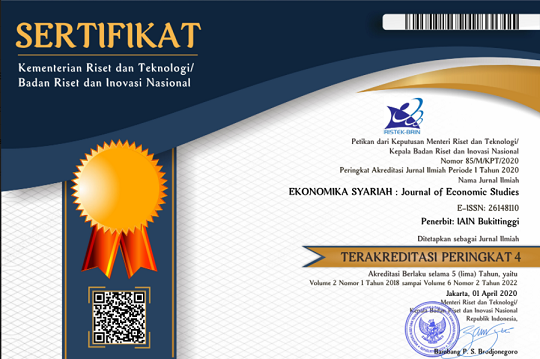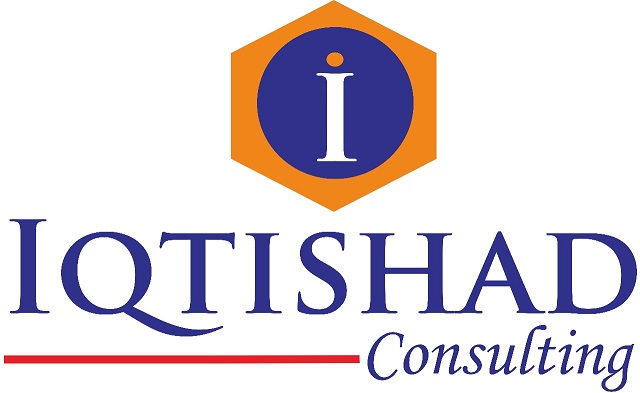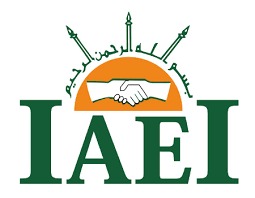Pengaruh Financial literacy Terhadap Preferensi Masyarakat Kabupaten Tanah Datar Memilih Produk-Produk Pendanaan Pada Perbankan Syariah
DOI:
https://doi.org/10.30983/es.v3i1.973Abstract
The purpose of this study investigates whether financial literacy affects the preferences of choosing the funding product at Islamic Banks. The research method used is a quantutative method that uses a sample of 385 customers of Islamic banks in Tanah Datar district, under condition 2018, this study reveals that financial literacy is positively associated with the preferences of choosing funding products. This finding offer the empirical evidence of the importance on the relationship of financial literacy to the preferences of choosing the funding product. It indicates that the financial literacy is a important point in Islamic banks thay will make peoples turn to Islamic banks . Furthermore, this research recommends strategy of increasing market share of Islamic Bank by increasing public’s finance literacy.
References
Badan Pusat Statistik. (2016). Kabupaten Tanah Datar dalam Angka. Tanah Datar: Badan Pusat Statistik Kabupaten Tanah Datar.
Ghozali, I. (2006). Struktural Equation Modelling Metode Alternatif dengan Partial Least Square PLS. Semarang: Penerbit UNDIP.
Mangkunegara, A. A. (2002). Perilaku Konsumen. Bandung: PT. Refika Aditama.
Manurung, A. (2009). Succesfull finacial planer a complete guide. Jakarta: Grasindo.
Muat, S., Miftah, D., & Wulandari, H. (2014). Analisis Tingkat Literasi Keuangan dan Dampaknya Terhadap Keputusan Pinjaman Pribadi. Economic and Business Research Festiva;, 465-478.
Noor, F., & Sanrego, Y. D. (2011). Preferensi Masyarakat Pesantren Terhadap Bak Syariah (Studi Kasus DKI Jakarta). Jurnal Tazkia Islamic Business dan Financial Review.
Oseifuah, E. K. ( 2010). Financial literacy and Youth Enterpreneurship in South Africa. African Journal of Economic and Manajement Studies, 164-182.
Otoritas Jasa Keuangan. (2004). Literasi, Edukasi, dan Inklusi Keuangan. Jakarta: Direktorat Literasi dan Edukasi.
Otoritas Jasa Keuangan. (2017). Strategi Nasional Literasi Keuangan Indonesia Revisit 2017. Jakarta: OJK.
Rizkina, Y. P., & Kartini. (2017). Analisis Nisbah Financial literacy dan Financial Behavior Mahasiswa S-1 Fakultas Ekonomi Universitas Islam Indonesia. Jurnal Mandiri Universitas Islam Indonesia, 76-99.
Robb, C., & Woodyard, A. (2011). Assosiation for Financial Counseling and Plang Education.
Sangadji, E., & Sopiah. (2013). Perilaku Konsumen: Pendekatan Praktis Disertai Himpunan. Yogyakarta: Andi.
Sholihin, M., & Ratmono, D. (2013). Analisis SEM-PLS dengan WarpPLS 3.0 untuk Hubungan Nonlinier dan Penelitian Sosial dan Bisnis. Yogyakarta: Andi.
Suryani, T. (2008). Perilaku Konsumen: Implikasi Pada Strategi Pemasaran. Yogyakarta: Graha Ilmu.
Widyati, I. (2012). Faktor-faktor yaang Mempengaruhi Literasi Keuangan Mahasiswa Fakultas Ekonomi dan Bisnis Universitas Brawijaya .
Downloads
Published
How to Cite
Issue
Section
Citation Check
License
Authors who publish with this journal agree to the following terms:
- Authors retain copyright and grant the journal right of first publication with the work simultaneously licensed under a Creative Commons Attribution-ShareAlike 4.0 International License that allows others to share the work with an acknowledgment of the work's authorship and initial publication in this journal.
- Authors are able to enter into separate, additional contractual arrangements for the non-exclusive distribution of the journal's published version of the work (e.g., post it to an institutional repository or publish it in a book), with an acknowledgment of its initial publication in this journal.
- Authors are permitted and encouraged to post their work online (e.g., in institutional repositories or on their website) prior to and during the submission process, as it can lead to productive exchanges, as well as earlier and greater citation of published work (See The Effect of Open Access).





